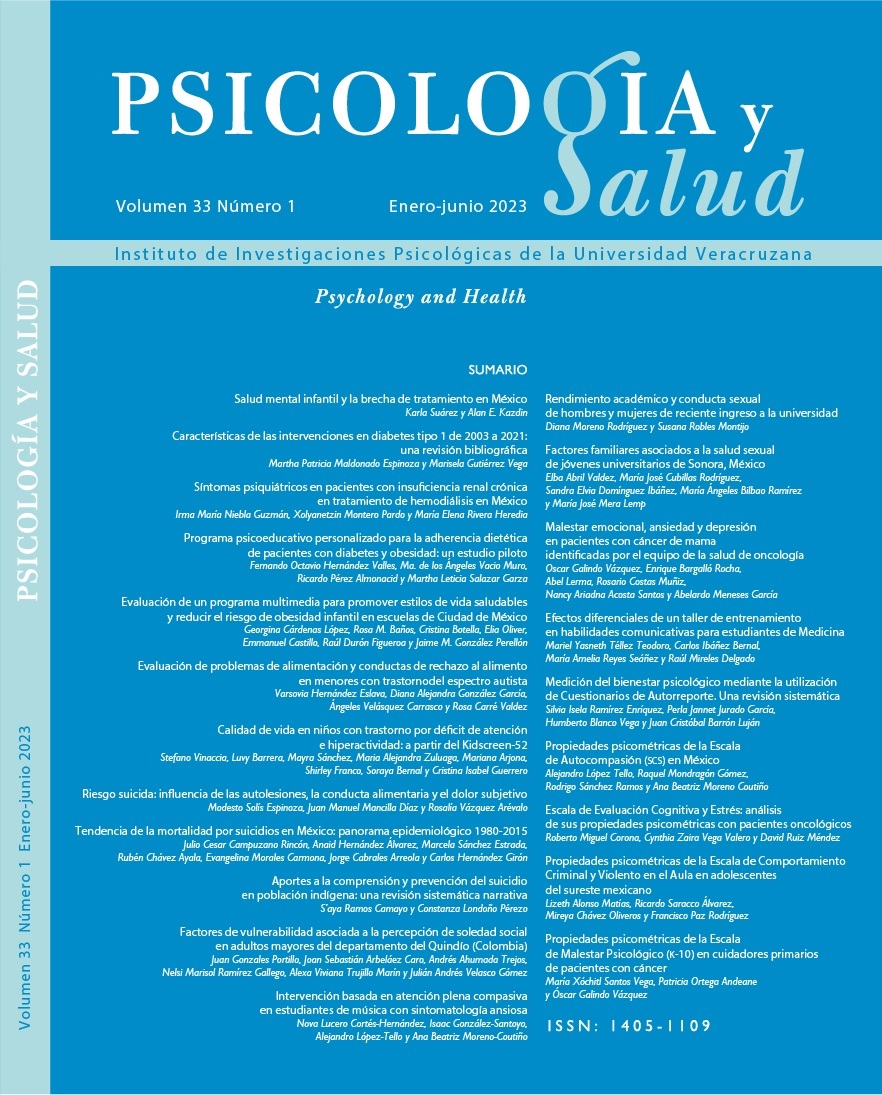Abstract
Type 2 diabetes mellitus is a worldwide public health problem associated with obesity and overweight. A strict diet is a critical part of the treatment, but it is common for patients to have difficulty adhering to it. The literature reports a variety of techniques increasing adherence, but there is not an evident a common factor among them. Objective. The present study sought to assess possible differences between two modalities of psycho-educational programs with differing levels of personalization. Method. The modalities were designed according to specific patients' needs and led to advancement along materials only when participants showed effective learning in each step. Eleven, randomly-assigned patients composed a personalized condition and ten a non-personalized one. Seven and five participants respectively completed the program, through a pretest-posttest design. Data collection included an adherence index scale and other physical records related to weight. Results. The main findings revealed that the difference between both modalities in the post-test was not statistically significant in any indicator. However, differences resulted significant between pre-test and post-test measures of the personalized intervention, with large effect sizes for most indicators. Discussion. Findings are discussed in terms of the program components likely to have made the difference, the benefits of the measures used, the experimental design, and the recommendations for entry-level diet adherence.
References
Clark, R.L., Famodu, O.A., Holásková, I., Infante, A.M., Murray, P.J., Olfert, I.M., McFadden, J.W., Downes, M.T., Chantler, P.D., Duespohl, M.W., Cuff, C.F. y Olfert, M.D. (2019). Educational intervention improves fruit and vegetable intake in young adults with metabolic syndrome components. Nutrition Research, 62, 89-100. Doi: 10.1016/j.nutres.2018.11.010.
Cohen, J. (1992). A power primer. Psychological Bulletin, 112(1), 155-159. Doi: 10.1037/0033-2909.112.1.155.
DeFronzo, R.A. (2004). Pathogenesis of type 2 diabetes mellitus. Medical Clinics of North America, 88(4), 787-835. Doi: 10.1016/j.mcna.2004.04.013.
Esden, J.L. y Nichols, M.R. (2013). Patient-centered group diabetes care: A practice innovation. The Nurse Practitioner, 38(4), 42-48. Doi: 10.1097/01.NPR.0000427608.99141.04.
Estrada, C. (2017). Evaluación de riesgos en investigaciones en psicología y disciplinas afines. Sophia Austral, 19, 93-101. Doi: 10.4067/S0719-56052017000100093.
Franz, M. (2017). Tratamiento nutricional médico en la diabetes mellitus y la hipoglucemia de origen no diabético. En M. L. Kathleen (Ed.): Krause Dietoterapia (14a ed.) (pp. 675-710). Amsterdam: Elsevier.
French, D.P., Wade, A.N., Yudkin, P., Neil, H.A.W., Kinmonth, A.L. y Farmer, A.J. (2008). Self-monitoring of blood glucose changed non-insulin-treated Type 2 diabetes patients’ beliefs about diabetes and self-monitoring in a randomized trial. Diabetic Medicine, 25(10), 1218-1228. Doi: 10.1111/j.1464-5491.2008.02569.x.
Hernández N., R. (2012). Instrumentos de recolección de datos en ciencias sociales y ciencias biomédicas. Scotts Valley, CA: Createspace Independent Publishing Platform.
Lynch, E.B., Mack, L., Avery, E., Wang, Y., Dawar, R., Richardson, D., Keim, K., Ventrelle, J., Appelhans, B.M., Tahsin, B. y Fogelfeld, L. (2019). Randomized trial of a lifestyle intervention for urban low-income African Americans with type 2 diabetes. Journal of General Internal Medicine, 34(7), 1174-1183. Doi: 10.1007/s11606-019-04894-y.
Meza, R., Barrientos G., T., Rojas M., R., Reynoso N., N., Palacio M., L.S., Lazcano P., E. y Hernández Á., M. (2015). Burden of type 2 diabetes in Mexico: Past, current and future prevalence and incidence rates. Preventive Medicine, 81, 445-450. Doi: 10.1016/j. ypmed.2015.10.015.
Nieves, R. (2019). Observación y autoobservación. En F. J. Labrador E. (Coord.): Técnicas de modificación de conducta (pp.121-137). Madrid: Pirámide.
Organización Mundial de la Salud (2003, 1 de julio). El incumplimiento del tratamiento prescrito para las enfermedades crónicas es un problema mundial de gran envergadura. Ginebra: OMS. Recuperado de https://apps.who.int/mediacentre/news/releases/2003/pr54/es/index.html.
Organización Mundial de la Salud (2021). Pacto mundial contra la diabetes. Ginebra: OMS.
Organización Panamericana de la Salud (s.f.). Protocolo de limpieza y desinfección de ambientes - Covid-19 (excluidos los establecimientos de atención de salud). Washington; OPS. Recuperado de https://covid19evidence.paho.org/handle/20.500.12663/506?locale-attribute=es.
Osborn, C., Amico, K.R., Cruz, N., O’Connell, A.A., Perez-Escamilla, R., Kalichman, S.C., Wolf, S.A. y Fisher, J.D. (2010). A brief culturally tailored intervention for Puerto Ricans with type 2 diabetes. Health Education & Behavior, 37(6), 849-862. Doi: 10.1177/1090198110366004.
Popp, C., Butler, M., St-Jules, D., Hu, L., Illiano, P., Curran, M., Schoenthaler, A. y Sevick, M.A. (2019). Adherence to self-monitoring of dietary intake during a weight loss intervention: Does a personalized approach maintain adherence? Current Developments in Nutrition, 3(Supplement_1), nzz037, FS11-04-19. Doi: 10.1093/cdn/nzz037.FS11-04-19.
Powers, A.C. (2012). Diabetes mellitus. En J. Jameson et al. (Eds.): Harrison Principios de medicina interna. (pp. 2968-3002). New York: McGraw-Hill.
Ribes, E. (2018). El estudio científico de la conducta individual: Una introducción a la teoría de la psicología. México: El Manual Moderno.
Rodriguez, M.A., Friedberg, J.P., DiGiovanni, A., Wang, B., Wylie-Rosett, J., Hyoung, S. y Natarajan, S. (2019). A tailored behavioral intervention to promote adherence to the DASH diet. American Journal of Health Behavior, 43(4), 659-670. Doi: 10.5993/AJHB.43.4.1.
Steinberg, D., Kay, M., Burroughs, J., Svetkey, L.P. y Bennett, G.G. (2019). The effect of a digital behavioral weight loss intervention on adherence to the dietary approaches to stop hypertension (DASH) dietary pattern in medically vulnerable primary care patients: Results from a randomized controlled trial. Journal of the Academy of Nutrition and Dietetics, 119(4), 574-584. Doi: 10.1016/j.jand.2018.12.011.
Walker, S.N., Pullen, C.H., Hageman, P.A., Boeckner, L.S., Hertzog, M., Oberdorfer, M.K. y Rutledge, M.J. (2010). Maintenance of activity and eating change after a clinical trial of tailored newsletters with older rural women. Nursing Research, 59(5), 311-321. Doi: 10.1097/NNR.0b013e3181ed6695.

